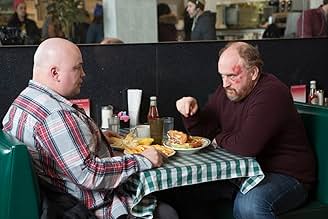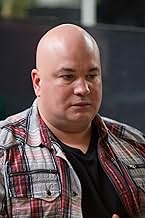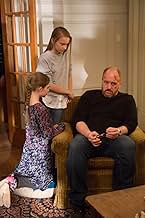Das Leben von Louie C.K., einer geschiedenen Komikerin, die mit zwei Kindern in New York lebt.Das Leben von Louie C.K., einer geschiedenen Komikerin, die mit zwei Kindern in New York lebt.Das Leben von Louie C.K., einer geschiedenen Komikerin, die mit zwei Kindern in New York lebt.
- 3 Primetime Emmys gewonnen
- 30 Gewinne & 109 Nominierungen insgesamt
Folgen durchsuchen
Zusammenfassung
Reviewers say 'Louie' is a unique blend of comedy and drama, exploring relatable themes like relationships and parenthood. The show is praised for its honest portrayal of Louis C.K.'s life, featuring stand-up segments and a semi-autobiographical approach. Critics appreciate its unconventional format, lack of continuity, and surreal elements, which contribute to its distinctive style. The cinematography and direction by Louis C.K. are noted for their authenticity and ability to evoke both laughter and deep emotional responses. Often compared to 'Curb Your Enthusiasm' and 'Seinfeld,' 'Louie' is recognized for its originality and depth of humor.
Empfohlene Bewertungen
10Muia17-1
This show as everything else can be compared to other shows but it is its own in many ways. First of which can be said is kudos to Louis C.K. is he greatly underrated and should be a much more respected star. His comedy is genuine and honest and i know it sounds corny but his show feels very real the dialogue and the situations are how real life i think would be. I've heard it be compared to seinfeld but the only comparison is that there are clips of louie doing stand up, the actual show is nothing like it. Also id like to commend FX on giving it time to grow, they are a very good network for that, same with SUNNY IN PHILLY, that show grew into an excellent show. Shows get canceled to quickly. Anyways to sum up. Louie gets a 10/10, its just my opinion.
I hate giving the 10-star rating because it appears exaggerated and the best I can do to avoid people looking down on the review/plea for people to watch this program is to say, "It's the best at what it's trying to be." I'm not going to use that statement to save my ass here because I'm not sure what this show is trying to be other than honest.
'Louie' is the first show I've come across that I absolutely refuse to let myself wait for DVD to see. It's the first show that I don't sit down to watch with the sole anticipation of having it either cheer me up with comedy or shock me with dramatic twists. 'Louie' is simply something I watch because it feels like I'm gaining life experience from it, which is impressive considering Louis C.K., or at least the Louie character's self-proclaimed life goals are to raise his kids and hold his title as World's Best Masturbator.
It's also impressive considering that I, and I'm sure many viewers, have already experienced nearly every situation this show covers, from being forced out of the house with no plans to being on a date with someone who thinks less of you for doing the right thing despite saying that he/she valued righteousness. So what's to gain from reliving these unpleasant situations every Tuesday evening?
Great shows like Curb Your Enthusiasm bank on this question by allowing the main character to vengefully act on his everyday irritations only to have it bite him in the ass by the episode's end. This way you can laugh at the absurdity while saying, "I know what he's feeling, man," followed by, "but I'm sure glad *I* didn't act on it." It's a winning formula because the audience always comes out unscathed. 'Louie' makes that show look like it's playing too safe (which it isn't, by the way.)
If the Louie character ever acts on his irritations, he does it in a way that almost feels like he's seen Curb, and thus trying to avoid any unnecessary harm while still following his gut instinct. In other words, he's a coward sometimes, just like we are. Curb's Larry David states in interviews that his eponymous character is more like him than he is. Louie is simply Louis, and perhaps, Louis is simply everybody, and PERHAPS that can be a little discomforting. But that's okay, because at least, just like when we look back on mistakes or simply situations that we wish we could have handled differently (so that we could've gotten laid that night), it's almost always hilarious. The difference here is that it's *always* hilarious. . . though it's still unbelievably discomforting.
For that, I'm more than happy to not save my ass on this one. Enjoy chewing on it, critics.
'Louie' is the first show I've come across that I absolutely refuse to let myself wait for DVD to see. It's the first show that I don't sit down to watch with the sole anticipation of having it either cheer me up with comedy or shock me with dramatic twists. 'Louie' is simply something I watch because it feels like I'm gaining life experience from it, which is impressive considering Louis C.K., or at least the Louie character's self-proclaimed life goals are to raise his kids and hold his title as World's Best Masturbator.
It's also impressive considering that I, and I'm sure many viewers, have already experienced nearly every situation this show covers, from being forced out of the house with no plans to being on a date with someone who thinks less of you for doing the right thing despite saying that he/she valued righteousness. So what's to gain from reliving these unpleasant situations every Tuesday evening?
Great shows like Curb Your Enthusiasm bank on this question by allowing the main character to vengefully act on his everyday irritations only to have it bite him in the ass by the episode's end. This way you can laugh at the absurdity while saying, "I know what he's feeling, man," followed by, "but I'm sure glad *I* didn't act on it." It's a winning formula because the audience always comes out unscathed. 'Louie' makes that show look like it's playing too safe (which it isn't, by the way.)
If the Louie character ever acts on his irritations, he does it in a way that almost feels like he's seen Curb, and thus trying to avoid any unnecessary harm while still following his gut instinct. In other words, he's a coward sometimes, just like we are. Curb's Larry David states in interviews that his eponymous character is more like him than he is. Louie is simply Louis, and perhaps, Louis is simply everybody, and PERHAPS that can be a little discomforting. But that's okay, because at least, just like when we look back on mistakes or simply situations that we wish we could have handled differently (so that we could've gotten laid that night), it's almost always hilarious. The difference here is that it's *always* hilarious. . . though it's still unbelievably discomforting.
For that, I'm more than happy to not save my ass on this one. Enjoy chewing on it, critics.
I watched this show for the first time last week after Wilfred (another great new show), and I must say - Louie is wondrously on a WHOLE new level. Where have I been?! Yes, the show is quite explicit, vulgar, and just plain dirty - all of which I'm not a huge fan, but the writing/dialogue depicts the everyday thoughts and issues that are really running in the minds of the rest of us, but we're just too afraid to speak our minds. That's what really amazes/captures me about this show. It is rough around the edges submerged with complex, bizarre, vulgar situations, yet the overall tone of the show is so...simple, mundane. This very stark contrast is not only captivating and mind-blowing, it is very intense and disturbing to the human psyche. It is just a whole new level of comedy. I am thoroughly and mindbogglingly wow-ed.
10jzappa
Seinfeld revolved around a stand-up comedian constantly sabotaged by the catastrophic social faux pas of himself and the people inextricably involved in his life, intercut with performance sets by the actual comic. So is Louie. But where Seinfeld was purportedly "a show about nothing," Louie is a show in which from moment to moment, you can safely expect nothing. Not only does Louis C.K. straddle the gaps in social protocol and everyday confrontations we all understand, but also the extremes of comedy and tragedy. It's a gallows comedy, in which we can find ourselves laughing in elation at the both wry and surreal absurdity of one moment, then clenching our chair arms in both tension and incredulity at moments of agonizing pain and even at times a true sense of impending brutality.
There is no continuity from one episode to the next, or even from one vignette to the next. Each episode is comprised of usually two scenarios book-ended by stand-up sets by Louie, which may or may not turn out to be part of one of the scenes. It's the direct inversion by an observant everyman's misanthrope of the TV sitcom. Whereas every sitcom we've ever seen has one essential soundstage, an ongoing play-like farce that runs before two cameras, all the same characters show up and everything not only works out but is just the same as before by the end, each week Louie will give a stream of consciousness an unsystematic narrative silhouette almost invariably a sequence of encounters with characters who enter and exit, yet very few ever return. Some actors and actresses return in different roles. Louie's mother is at one point played by an old woman as an appalling malignant narcissist and in another episode a humble, warm-hearted young working-class woman.
The show is written, directed and edited by its star, and he creates a visually realistic look and atmosphere for his small stories, captured quite cinematically. In the God episode, arguably the boldest, most powerful episode, he injects solemn amber tones, almost I dare say comparable to Gordon Willis' work on the Godfather films. There is a considerable proliferation of long takes in which two characters will share dialogue that sounds and feels no less real than that which we'll share with someone tomorrow. Sometimes, he's bold enough to prolong a single, stationary take in which nothing is being said on-camera, but all the action that affects the character in the shot is occurring off-camera, and in that very single take, we're carried seamlessly and steadily from deadpan absurdity to genuine terror. Then comes the cut: Life goes on; nothing's really that big of a deal. Simply put, each week, C.K. delivers one or two of the most powerful and memorable short films you may ever see.
There is no continuity from one episode to the next, or even from one vignette to the next. Each episode is comprised of usually two scenarios book-ended by stand-up sets by Louie, which may or may not turn out to be part of one of the scenes. It's the direct inversion by an observant everyman's misanthrope of the TV sitcom. Whereas every sitcom we've ever seen has one essential soundstage, an ongoing play-like farce that runs before two cameras, all the same characters show up and everything not only works out but is just the same as before by the end, each week Louie will give a stream of consciousness an unsystematic narrative silhouette almost invariably a sequence of encounters with characters who enter and exit, yet very few ever return. Some actors and actresses return in different roles. Louie's mother is at one point played by an old woman as an appalling malignant narcissist and in another episode a humble, warm-hearted young working-class woman.
The show is written, directed and edited by its star, and he creates a visually realistic look and atmosphere for his small stories, captured quite cinematically. In the God episode, arguably the boldest, most powerful episode, he injects solemn amber tones, almost I dare say comparable to Gordon Willis' work on the Godfather films. There is a considerable proliferation of long takes in which two characters will share dialogue that sounds and feels no less real than that which we'll share with someone tomorrow. Sometimes, he's bold enough to prolong a single, stationary take in which nothing is being said on-camera, but all the action that affects the character in the shot is occurring off-camera, and in that very single take, we're carried seamlessly and steadily from deadpan absurdity to genuine terror. Then comes the cut: Life goes on; nothing's really that big of a deal. Simply put, each week, C.K. delivers one or two of the most powerful and memorable short films you may ever see.
Say what you will about Louis C.K. but his talents as a director, writer and actor are truly incredible. The writing in "Louie" is at times hilariously vulgar and other times touching and sad; there are moments of sincere honesty and other times of complete bizarreness. That is one of the ways the show is truly one-of-a-kind - you simply don't know what you'll get in any particular episode. Aside from that, the acting, directing and cinematography are all fantastic in their own right. If you're not ready to commit to the show, watch Horace and Pete (2016) and you'll be running to see more from this man shortly after. Masterpiece Television. 👏
Wusstest du schon
- WissenswertesThe series only shoots for three days per week. Louis C.K. has custody of his children for the rest of the week and refuses to shoot on those days. On those days, he edits the episodes while his children are at school. According to C.K., the crew dislikes the schedule but has to accept it.
- VerbindungenFeatured in Writer's Draft: Louis C.K. of Louie (2010)
Top-Auswahl
Melde dich zum Bewerten an und greife auf die Watchlist für personalisierte Empfehlungen zu.
Details
- Erscheinungsdatum
- Herkunftsland
- Sprache
- Auch bekannt als
- Луї
- Drehorte
- The Beaumont, 730 Riverside Drive, Harlem, Manhattan, New York City, New York, USA(Louie's apartment, season 2-)
- Produktionsfirmen
- Weitere beteiligte Unternehmen bei IMDbPro anzeigen
Zu dieser Seite beitragen
Bearbeitung vorschlagen oder fehlenden Inhalt hinzufügen











































